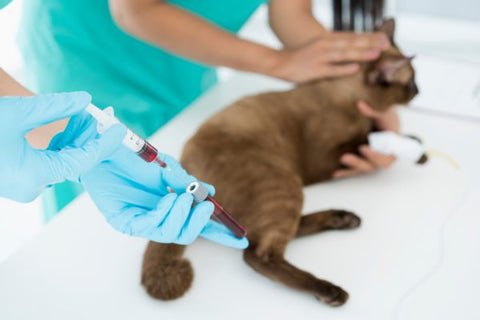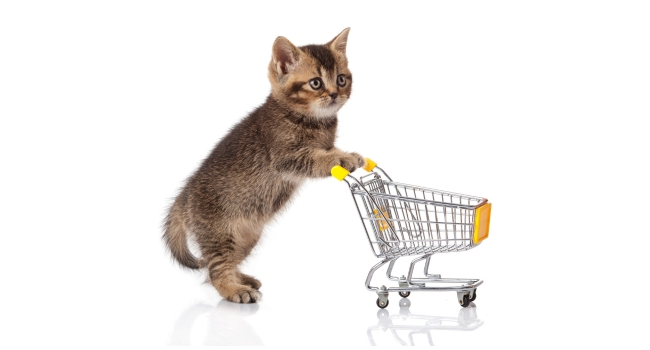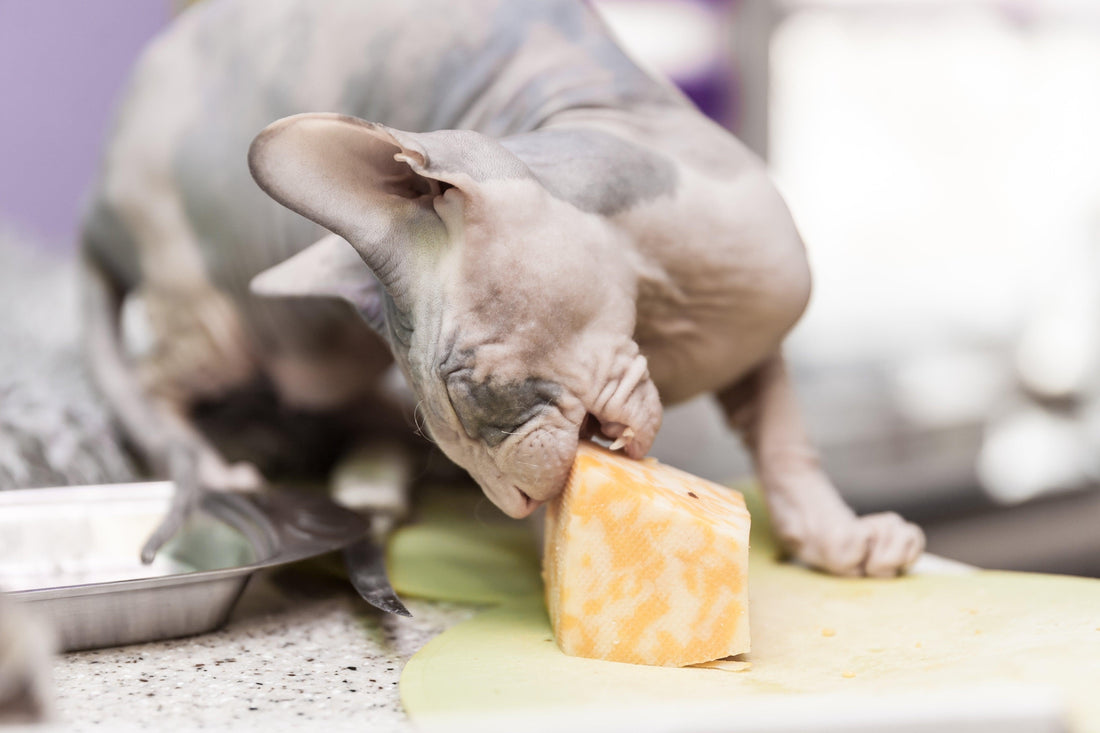All types of cheeses such as cheddar, mozzarella, and camembert are a favorite of a great many people. You might not have a favorite yet, but a popular question on every cat lover's mind is can cats eat cheese?
If you are a cat owner, this question may have crossed your mind at some point as well.
With so many different varieties out there, it might seem like cats should be able to enjoy some of these choices as well.
Unfortunately for our feline friends, this is not a straightforward answer as we would like, but with a little research and inspection, it is possible to find out whether or not cats should eat cheese and what might happen if they do.
Keep Reading!
Nutritional Profile of Cheese

Cheese is made from milk and comes in a variety of types. It is a high-calorie food with a fair amount of fat and sodium, but it also contains calcium, protein, and vitamins.
A 28-gram slice of cheddar cheese will give 113 calories. Additional nutrition value is listed below.
- Total Fat 9.3 g
- Cholesterol 28 mg
- Sodium 183 mg
- Total Carbohydrate 0.9 g
- Dietary Fiber 0 g
- Sugar 0.1 g
- Protein 6.4 g
- Vitamin D 0.2 mcg
- Calcium 199 mg
- Iron 0 mg
- Potassium 21 mg
Can Cats Eat Cheese?
As obligate carnivores, their digestive system processes meat perfectly but has difficulty processing other animal dairy products like milk and cheese.
It is important to know that while cheese contains protein, cats do not need it in the same way humans do.
They require meat protein for sustenance and cannot get this from cheese. For this reason, many veterinarians recommend against feeding cats any form of dairy as a regular diet item.
Why is Cheese Bad for Cats?

Cheese is bad for cats because the lactose in cheese is not easy to digest. Lactose is a type of sugar found in milk and when eaten by someone who doesn't have the enzyme needed to process it and can cause stomach upset.
Cats do not produce enough lactase enzymes in their body, which is why cheese can be harmful to them.
Lactase enzymes help break down milk sugars (lactose) into simple sugars that the body can use.
Without enough lactase enzymes, your cat’s body will not be able to properly digest the milk and cheese content in these foods. If eaten too often or in large amounts, this can lead to serious conditions.
Besides lactose intolerance, cheese can also lead to weight gain in your cat, thanks to its high-fat content.
Furthermore, cheese contains an abundance of calories and cholesterol, and both of these together can contribute to weight gain.
Additionally, cheese doesn't go well with cats because it contains high levels of sodium, which can cause diarrhea, vomiting, lethargy, ataxia, excessive thirst, and urination.
Can Kittens Eat Cheese?
Newborn kittens produce lactase for the first eight weeks of their lives, allowing them to digest their mother's milk. It is okay for them to eat cheese during these eight weeks.
While kittens are capable of tolerating cheese's sugar content, they may not be able to tolerate its higher levels of salt.
After weaning, a kitten's production of lactase begins to drop, resulting in lactose intolerance.
Cheese Varieties are based on
It is common to eat cheese, but not all cheeses are the same. They mostly differ in the following ways:
- Value of fat
- Sodium Level
- Moisture content
The three levels of these factors can lead to different levels of food safety risk. For example, a low-sodium cheese has fewer health risks than a high-sodium cheese.
Low-fat cheese poses less risk than high-fat cheese because it does not contain as much fat which may lead to obesity or cardiovascular diseases such as stroke or heart attack.
Are Cats Allowed to Eat Cream Cheese?
In spite of it being low in lactose and salt and one of the safer choices for your cat to eat, its high-calorie value makes it unsuitable for cats. So avoid feeding cream cheese to your cat.
Is Parmesan Cheese Safe for Cats to Eat?
Cheese is usually considered a delicacy in the cat-eating world. The lactose in cheese is what cats are not used to and can cause stomach upset.
Low-lactose cheese such as parmesan is generally safe for cats to eat in small quantities occasionally.
It is important to remember that even a low-lactose cheese can still be dangerous if your cat eats too much of it at one time.
Can Cats Eat Blue Cheese?

Cats can eat cheese in some cases, but blue cheese cannot be digested by them, leading to vomiting and diarrhea. Blue cheese is also high in calories, which can have a negative impact on the health of cats.
What about Plant-Based Cheese?

Can cats eat feta cheese? There are a variety of vegan cheeses that are made from soy, nuts, and vegetable oil instead of cow's milk.
Plant-based cheeses like vegan cheddar and vegan mozzarella are often processed and less nutritious than regular dairy cheeses and contain more sodium.
To make a long story short, high sodium is poisonous to your cats.
The Symptoms Cats can Experience after Consuming Cheese
If your cat is eating cheese often, there are a few signs that may indicate too much of the dairy product has been consumed. If you notice any of these symptoms, it's time to ask your vet for advice:
- Vomiting
- Bloating
- Diarrhea
- Loss of appetite
- Itchy skin
- Excessive gas
- Tummy ache
- skin licking
- Constipation
If you notice any of these symptoms in combination with the consumption of cheese, take them to the vet as soon as possible.
Is it Okay for Cats to Eat Cheese as a Treat?

Small amounts of cheese are okay for cats. Give just one tiny bit of new food at a time. When your cat shows signs of trouble, such as vomiting, diarrhea, or trouble digesting the treat, you should stop giving it the treat immediately.
Other Ingredients Found in Cheese Which Might not be Best for Your Cat
There are several different ingredients found in cheese that might not benefit your kitty and should be avoided.
- Onions
- Chives
- Scallions
- Leeks
- Garlic
- Shallots
- Nuts
Onions can cause gastrointestinal upset in felines and garlic is toxic to cats. In addition to what's mentioned, there are also many other foods that can harm cats when they're over-consumed.
What Should I Do If My Cat Ate Cheese?
The effects of the dairy product depend on how much was consumed and if any other foods were eaten before or after the cheese. If your cat shows symptoms of a dairy product overdose, call your vet immediately.
Keep Cats Away From Cheese
Curiosity drives cats to investigate every inch of their environment, tasting all of the different things around them.
It is crucial to keep cheese out of reach because cats can become addicted to high-calorie, fatty food and they may eat too much.
Cats are lactose intolerant and their digestive systems cannot break down the casein in cheese. This leads to an upset stomach and diarrhea.
What Causes Dairy Allergies in Cats?
Dairy allergies to cats can happen because of a wide variety of factors. It's important to figure out the cause so you can take steps to address the problem.
The most common cause of dairy allergies in cats is intolerance to casein. Casein is a protein found in milk and cheese.
Cats with this problem usually show symptoms of vomiting, diarrhea, and itchy skin. If it's intolerance to casein, then there are alternative food sources available.
Cats with sensitive stomachs or over-reactive immune systems can also be allergic to dairy products.
The best way to avoid the possibility of your cat developing a dairy allergy is to keep them on a strictly meat-based diet.
If Your Cat Has a Dairy Allergy, How Can the Vet Help?

If you think your cat is allergic to dairy, ask your vet for an examination. The vet can check the dairy allergy in a few ways to determine its link to the cat's symptoms.
To find out whether the dairy allergy was to blame for the symptoms, the veterinarian will perform a series of tests such as:
- Physical examination
- Urinalysis
- Chemical blood profile
A veterinarian may also have you bring in a sample of the food that you feed your cat and watch how the cat's body reacts when they eat it.
If the vet determines that your cat has an allergy, they may recommend making dietary changes in order to fix this problem. The vet can prescribe a hypoallergenic diet that contains only poultry or meat proteins.
The vet will also provide you with a list of foods to avoid so that you can keep your home free of any dangerous triggers for your cat.
Other Foods Your Cat Should Avoid
Cats need to have their diets monitored closely by their veterinarians. Too much or too little of some nutrients can be fatal. Your cat can enjoy your human snacks if you make sure they are not harmful to the cat.
Other foods to avoid feeding your cat include:
- Coffee
- Alcohol
- Grapes and raisins
- Xylitol
- Citrus fruits
- Coconut
- Mushrooms
- Raw bread dough containing yeast
Key Takeaways
- Cats are lactose-intolerant, so the cheese isn't a good option for cats. Lactose is very low in some cheeses, such as cheddar and Swiss. But even so, these cheeses still contain salt and preservatives that lead to serious conditions.
- If your cat is healthy, he or she can have cheese, but rarely and in small amounts.
- It is always best to consult with a veterinarian before making any changes to your pet's diet plan, especially when it comes to adding new foods.
Importance of Pet Insurance
Pet insurance is a great way to protect your animal's health. It can be hard to predict when an accident will happen, but with pet insurance, you're covered.
There are a few different types of plans depending on your needs, and it only takes minutes to get coverage for your pet.
Some pet insurance companies will even cover 100% of veterinary expenses. So make sure to choose the best pet insurance plan for your furry friend.
Once you have a plan in place, vet bills will never be too high because they'll already be covered by the policy.
It's important that we all take care of our animals' safety and well-being so they can enjoy their lives just as much as we do ours.
What Makes Genius Litter Different From Ordinary Litter?

Say goodbye to hauling heavy bags and hello to easy Genius Litter.
With our innovative non-clumping litter formula, you'll need less of it. One bag of our disposable Genius Litter lasts up to a month, so you won't need to refill the box as often and can save money on monthly costs.
One thing that separates us from traditional litter is that Genius Litter changes color to indicate when your cat has a potential health issue, so you can get them help before it becomes an urgent medical situation.
All you need to do is set up a delivery date with us each month, and rest easy knowing that Genius Litter will arrive at your doorstep every 30 days.
For a convenient solution for your cat, try Genius Litter today!
Why Is Lysine So Important For Your Pet?

Protect your pet's immunity!
Have you noticed that your cat is coughing, sneezing, and having rapid breathing? Or maybe he/she has been scratching more than usual?
These are all signs of a weakened immune system. One way to prevent this from happening is by using lysine supplements.
Lysine plays a key role in your pet's immunity because it helps to regulate the immune system.
Without enough lysine, your pets will be more susceptible to illness because their immune system can't fight off infections as efficiently.
When they are sick, they will also be less able to absorb nutrients and make use of other supplements that can help them feel better.
Give your pet the support they need. Our Lysine supplement provides essential amino acids to help support a strong immune system.
Order now to get 300 one-scoop servings or 150 two-scoop servings and don't worry about expiry!





